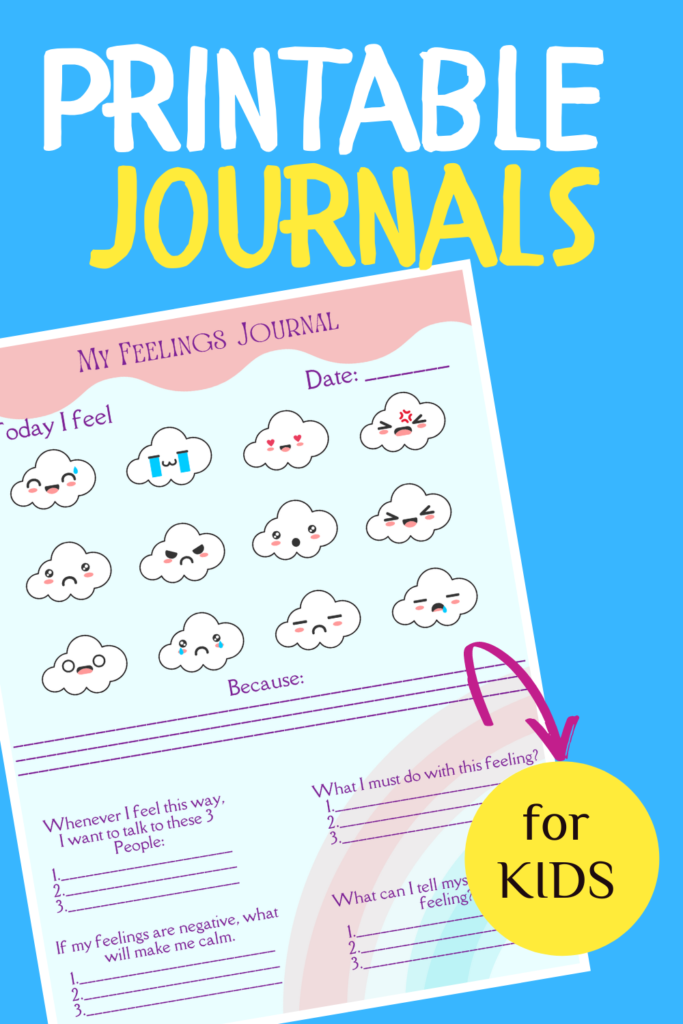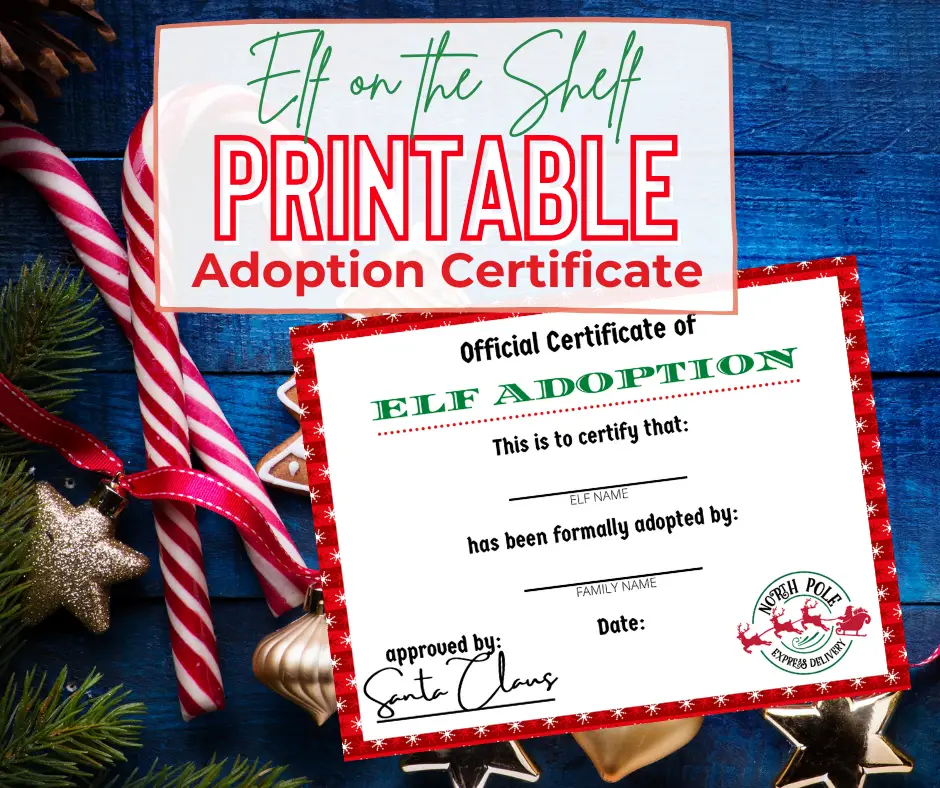Journaling for Kids
Journaling has become a popular way for adults to manage their mental health. However, did you know that journaling can be great for kids too? Many studies have shown that young people who keep journals experience fewer symptoms of depression, anxiety, and other mental health issues. Journaling is a great way for kids and teens of all ages to get their thoughts out on paper and process them. So, how does journaling for kids work and what benefits does it provide? Let’s talk about it! Also, there is a free printable Journal at the bottom of this article for you to get started with.

For your convenience, this post contains affiliate links. As an Amazon Associate, I earn from qualifying purchases.
What is journaling for kids?
Journaling for kids is a lot more relaxed than it is with adults. There aren’t really any specific rules to follow, and they don’t need ornate journals either! Instead, most children are happy just using basic spiral notebooks that can be found at the local dollar store or pharmacy- aisle where you will also find stationery paper products such as envelopes (if your child likes writing letters).
The goal of journaling, in this case, should focus on introducing them to an activity that may help manage their emotions from time to time by giving them somewhere safe where anything goes; whether they choose to write out their thoughts or draw and doodle it all out. This is their space.
The best way to get your child into journaling is by letting them have complete control over how it happens. If you try and establish rules, they’ll likely rebel against the idea of having homework or any other responsibilities involved with their hobby, and once that starts happening there’s no going back!
Journaling is a place to write with no rules or limitations. If they start worrying about their punctuation, it won’t be mindful writing anymore and will take away from the experience of diving into what’s going on inside themselves. So let them know that they can write as it flows out of them.
One of the best parts about journaling for kids is how personal it can be. So, while there are no rules for kids when they are journaling, there are some for parents, like no snooping! If you want your child to get out their feelings and thoughts, they need privacy so that’s why as difficult as this may sound, letting them have some alone time without any interruptions in order to get those creative juices flowing with no distractions or fear of reactions from parents or other adults around them makes sense!
Journaling is one of the most under-appreciated habits out there. It’s so simple, yet surprisingly profound for your mental health and well-being! Even if they journal for just a few minutes each day, it can provide a lot of benefits.

Benefits of journaling for kids
There have been a lot of studies carried out to determine the benefits of journaling for kids. When practiced regularly, journaling can help to boost both mental and physical health.
Here are some of the main benefits journaling can offer your child:
It helps to build emotional intelligence
When you’re a kid, it can be hard to manage your emotions. Depending on the age of your child, they might not always understand what’s going through their minds or how those strong feelings make them feel. Writing in a journal helps build up emotional intelligence over time as children recognize more about themselves from their writings which then leads to better self-awareness as well as control over when and how they react emotionally.
Inspiring creativity and problem solving
Journaling can be an excellent way to solve problems and foster creativity. Many kids find themselves creating stories in their journals of made-up events, this helps them come up with ideas for managing their thoughts.
Journaling is an excellent way for kids to identify solutions and learn more about themselves. Studies show that those who journal tend to develop better problem-solving skills than others, which means you can help your child grow into a successful adult by teaching him or her how valuable this skill really becomes!
It can help them to develop a more positive mindset
Journaling is an excellent way for kids to develop a more positive mindset. If you teach your kids how to create a gratitude journal and then have them write down three things they are grateful for, they’ll start looking at life with an optimistic eye and find gratitude in surprising places!
The earlier kids learn how to focus on the positive, not only does it make their lives easier as adults but also helps them build a more balanced perspective and disposition. This skill will be essential for success in any area of life!
A safe place for them to express themselves
The process of self-expression is often difficult for children and adolescents. They may feel like they don’t know how to deal with the unfamiliar thoughts or feelings that come with growing up, but learning about journaling will give them more control in this area as well making you happier too!
Giving kids the freedom to express themselves freely can help them become calmer, more well-rounded individuals. They will experience fewer angry outbursts and be better equipped for handling their emotions in a constructive way
The key thing here though is for you as parents to make sure there isn’t any intrusion from other people when it comes time for journaling or any invasion of privacy after, give your children privacy so that these feelings can flow without interruption!
These are only a few of the benefits kids can receive from journaling on a regular basis. So now the important question is, how can you get them started?

How to get your child started
To get your kids into journaling, you don’t need anything fancy. Give them a basic notebook and let them choose what kind of pen or pencil they want to use! They may even want several notebooks just so they can use each one for different things, like gratitude prompts, stories, plus one for “I’m bored” doodling and writing whatever comes out.
After you have collected the journal of choice and writing supplies they will need, it is time to get your child writing and there are several ways to get started. These are some of the techniques I have found work best:
Lead by example
Like everything we try to teach our children, it works better if we use the “do what I do” strategy instead of the “do what I say, not what I do” approach. If you want your kids to take an interest in journaling, start journaling yourself if you don’t already. If you already journal make sure they see you doing it. Kids always want to follow whatever adults are doing. So, if they see you sitting there writing in your journal, they are inevitably going to want to do it also.
Be sure they see you writing in your journal but don’t let them see what you are writing. This is the perfect time to explain that journals are private and only the person who writes in them sees what it says. For younger kids the idea of their own secret book will excite them, for older kids it will confirm to them that you respect that their journal is their private book to write in.
Make it fun with stickers and felt pens
Kids often have a short attention span and become fickle with what they like to do. Therefore you will want to keep this activity as enjoyable and fun as possible in order to make journaling a consistent part of their regular routine. If they like stationery products perhaps start a journal sticker collection or find them some fun felt pens in an endless color assortment.
If a pen and notebook is all that strikes their interest when it comes to journaling stationery, perhaps keep a few of their favorite snacks on hand so they can have a special treat while they wander off to write, simply start a routine around journaling and snack time in the beginning and it will be an easy way to incorporate journaling without nagging. Most importantly keep them in charge of their journaling sessions, that sense of power and independence will also help to make it more enjoyable for them.
Provide challenges and prompts
While most kids do have a great imagination, it doesn’t mean they will always know what to write especially when they first start journaling. Staring at a blank page can be daunting for anyone, including kids. So, to get them started it’s a good idea to give them some writing prompts and then let them go in whichever direction they choose.
Some prompts include asking them to write down what their favorite things are and why they like them. Or to create a story about a favorite memory they have. There are countless writing prompts all around the internet, depending on what area you want them to start thinking about. Here are some more journal prompts for kids to get the writing flowing:
10 Journal Prompts for Kids
- What was your favorite part of today?
- What are you most looking forward to tomorrow?
- If you could have any superpower, what would it be?
- What is the best thing your mom or dad has ever done for you?
- Draw a picture of your family.
- Write about a time when you were really proud of yourself.
- What is your favorite kind of ice cream?
- If you could visit any place in the world, where would it be?
- What are some things that make you happy?
- Who is your best friend and why do you like them so much?

Free Journaling for Kids Printable Journals
There are so many things that your child can journal about. Gratitude journals, travel journals, goals journals, and daily journals, are all fun options to try. Here are a few printable journals to try with your kids as they get started journaling.
End of the Year Printable Journal for Kids
Printable Daily Gratitude Journal
My Feelings Printable Journal
As you can see, journaling is a fantastic outlet for kids that provides so many great benefits and aids in their social and emotional development. I hope these tips can help when getting your kids started with journaling. Remember, let them write when and what they want to, no pressure, no need to write every day, no deadlines, this is about self-care, not homework.




![Aidan’s Story [Getting Diagnosed with Autism]](https://mommyhoodlife.com/wp-content/uploads/2012/10/Autism-Diagnosis-Story.png)

